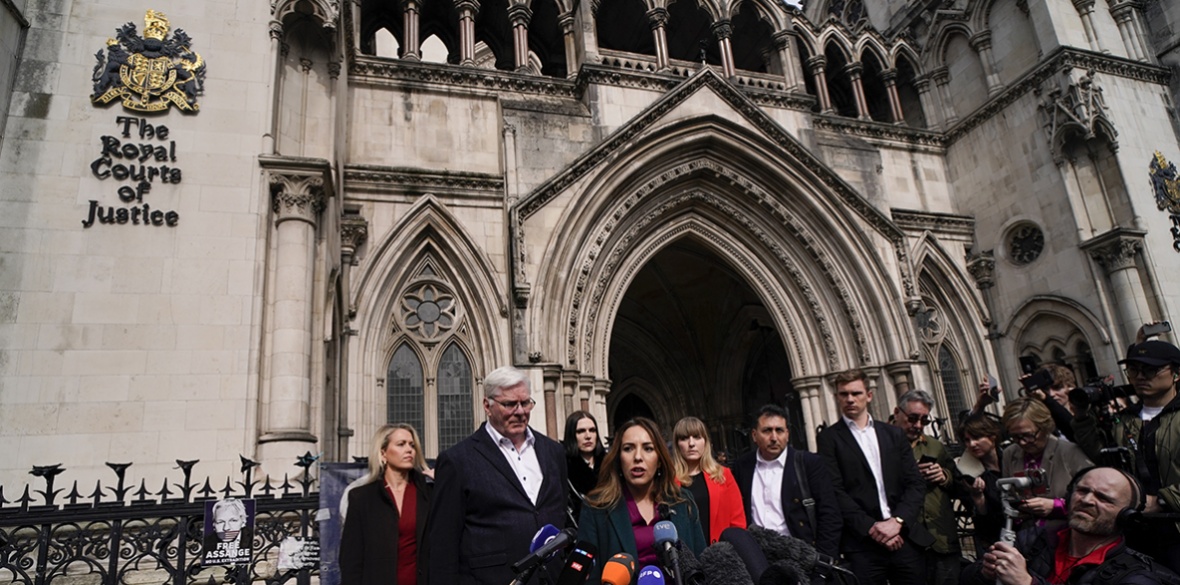This is the last article you can read this month
You can read more article this month
You can read more articles this month
Sorry your limit is up for this month
Reset on:
Please help support the Morning Star by subscribing here
THE case against Julian Assange “criminalises journalism” and must be dropped immediately, his supporters demanded today.
The Wikileaks founder was left in limbo after the High Court in London hit pause on its decision on whether it will grant him permission to appeal his extradition to the United States.
The court ruled that the US must provide “satisfactory assurances” or Mr Assange could take his case to an appeal hearing.
Mr Assange’s wife Stella said the outcome was “bizarre” with the court “tying itself in knots.”
US prosecutors are seeking to put Mr Assange on trial on 18 counts after publishing hundreds of thousands of military records and exposing US war crimes.
This morning, Judges Victoria Sharp and Jeremy Johnson gave US authorities three weeks to promise that Mr Assange will not receive the death penalty.
They also asked for assurances that he will not face prejudice at trial or sentencing “by reason of his nationality” and that he be given the same First Amendment rights as US citizens.
The court rejected most of Mr Assange’s arguments for an appeal, including the claim that the case against him is politically motivated.
The case is now set to be reconsidered on May 20.
Hundreds of supporters gathered outside the Royal Courts of Justice during the hearing, despite having less than 24 hours notice.
They were joined by Labour MPs Richard Burgon, Apsana Begum and former Labour leader Jeremy Corbyn.
After the ruling, Ms Assange said that the US assurances are “not worth the paper they are written on.”
“What the courts have done has been to invite a political intervention from the United States… send a letter saying ‘it’s all OK’.”
She demanded the US drop the case altogether, and said that it should have been thrown out of British courts because it “criminalises journalism.”
The US has repurposed the Espionage Act in its bid to bring charges against Mr Assange.
The century-old law was initially used to prosecute spies in World War I.
Ms Assange said the case is “sending a chilling effect that is creating not just a legal precedent but a political precedent that is putting journalists all over the world at risk.”
National Union of Journalists general secretary Michelle Stanistreet said that Mr Assange is being prosecuted for “activities that are daily work for investigative journalists — finding sources with evidence of criminality and helping them to get their stories out into the world.
“If Assange is prosecuted, free expression the world over will be damaged.”
In January 2021, then-district judge Vanessa Baraitser said that Mr Assange should not be sent to the US, citing risk of suicide.
But later that year, US authorities won their bid to overturn the block on his extradition.
In February, Mr Assange’s legal team sought permission to challenge the original judge’s dismissal of other parts of his case to prevent his extradition.
The Wikileaks founder has endured 13 years of legal battles across Britain since he sought asylum at the Ecuadorian embassy — a saga now set to be prolonged following today’s ruling.
Simon Crowther, Amnesty International’s legal adviser, said that Mr Assange is left in “limbo” along with “all defenders of press freedom.”
He argued that US guarantees are “deeply flawed” and that diplomatic assurances in the Assange case are “riddled with loopholes.”
“In trying to imprison him, the US is sending an unambiguous warning to publishers and journalists everywhere that they too could be targeted and that it is not safe for them to receive and publish classified material — even if doing so is in the public interest.
John Rees, of the Free Assange campaign, said the court’s ruling was “basically a vote of no confidence in the US judicial system”, but warned that American authorities “can always rescind any such assurances once (Assange) is in the states and there’s nothing that could be done about it.”
“He’s the first journalist ever to be tried under the US Espionage Act - and the whole US case is that he should be treated as a spy.
“Well, whoever heard of a spy being given the First Amendment rights?
“A spy is never treated like an American citizen.“
“The whole thing is collapsing under the weight of its own contradictions.”









